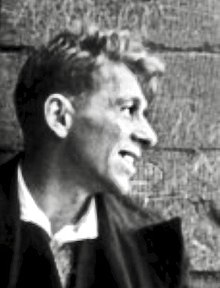Georg Götsch
Georg Götsch (born March 1, 1895 in Berlin , † September 26, 1956 in Friedrichshafen ) was a German music teacher . Georg Götsch is an important figure in the German youth movement and the youth music movement .
Youth movement
In 1923 Georg Götsch took over the management of the Alt-Wandervogel youth association from Ernst Buske . At the Fichtelgebirgstreffen the Bundischen youth near Weißenstadt then joined on 3rd / 4th. August 1923 the Alt-Wandervogel, the "Wandervogel-Wehrbund", the "Wandervogel-Jungsbund" and the "Schlesische Wandervogel-Jungsbund" together to a common union "Alt-Wandervogel, German Young Shaft". The term church youth was elected following the term "young team" of Silesia for their older members. The federal leaders of the mentioned wandering bird federations and decided their "Confederation in opposition to everything political and patriotic". In 1927, after some scout associations had also joined it, the federal government was renamed the German Freischar . When the German Freischar and Großdeutscher Jugendbund merged on May 4, 1930, Götsch was appointed the Freischar's confidante towards the federal leader Adolf von Trotha . On the same day, at Götsch's request, Eberhard Koebel was expelled from the group without a special expulsion process. When Trotha also agreed to join the Young National Federation in May 1930 , Götsch resigned his offices in the German Freischar.
Youth music movement
The youth music movement after 1918 was supported by two groups: The Musikantengilde (from 1922) around Fritz Jöde and the Finkensteiner Bund around Walther Hensel . Georg Götsch was one of the leading figures in the musicians' guild.
Georg Götsch had already agreed to take on the role of music teacher at the reform pedagogical school by the sea on the North Sea island of Juist, which was founded and led by Martin Luserke . Instead, however, in 1929 he became head of the newly founded Musikheim in Frankfurt (Oder) , a leading German training center for music teachers, and headed it until 1942.
The building was constructed by the architect Otto Bartning and furnished by the Bauhaus designer Erich Dieckmann . The Kleist Theater Frankfurt (Oder) resided there from 1946 until its closure in 2000 . Otto Bartning was later won over to the renovation of Fürsteneck Castle and designed the ballroom there based on the hall of the music hall.
(Music) historians argue about how far Georg Götsch was entangled with National Socialism . It is evident in his writings that he cultivated a way of thinking in ethnic categories, which was not unusual at the time . He related this to the cultural identity of a nation .
Fürsteneck Castle
Georg Götsch was involved in founding the Heimvolkshochschule Burg Fürsteneck from 1952 and in the following years until his death without a formal function, but as a stimulating personality. In particular, he has anchored music and cultural education in the educational program from the very beginning. From parts of his estate, a study cell was set up at the castle, which still bears his name today. Some of the traditions that have been cultivated to this day, such as the “Fürstenecker Morgenkreis” and the cultivation of the English counter dances based on John Playford, go back to Georg Götsch.
Publications
- From the life and thoughts of a youth choir, Wolfenbüttel 1926 (annual report, Norway trip 1925)
- England trip in 1926 of the Märkische Spielgemeinde, Wolfenbüttel 1927
- About the German youth movement as people's conscience, Leipzig 1928
- Music education - testimonies of a path, Volume I: Reflection, undated
- Arts Education - Evidence of a Path, Volume II: Report, 1953
- Music education - testimonials of a path, Volume III: Task, 1956
- Sociable dance book - Volume 1: Elevators. no year
- Sociable dance book - Volume 2: Tanzkanons, 1950
- Sociable dance book - Volume 3. Choral Dances, 1955
- German Choral Songs - Volume 1, 1949
- German Choral Songs - Volume 2, 1949
- German Choral Songs - Volume 3, 1951
- English songbook, 1953
- Old counter dances (with Rolf Gardiner), 1928 (reprint 1950)
- New counter dances (with Rudolf Christl), 1956
- Sounding Life Choir Songbook, 1950
- Signs of life, evidence of a path (with Erich Bitterhof), 1969
literature
- Ernst Waeltner: Götsch, Johann Gottfried Georg. In: New German Biography (NDB). Volume 6, Duncker & Humblot, Berlin 1964, ISBN 3-428-00187-7 , p. 577 ( digitized version ).
Web links
- Literature by and about Georg Götsch in the catalog of the German National Library
- BURG FÜRSTENECK, Academy for professional and musical-cultural further education
- Musische Gesellschaft eV
- Georg Götsch and the Musikheim in Frankfurt / Oder
Individual evidence
- ^ Kurt Sydow: The life journey of Martin Luserke . Lecture on the occasion of the 100th birthday of Martin Luserke on May 3, 1980, on: luserke.net
| personal data | |
|---|---|
| SURNAME | Götsch, Georg |
| BRIEF DESCRIPTION | German music teacher |
| DATE OF BIRTH | March 1, 1895 |
| PLACE OF BIRTH | Berlin |
| DATE OF DEATH | September 26, 1956 |
| Place of death | Friedrichshafen |
